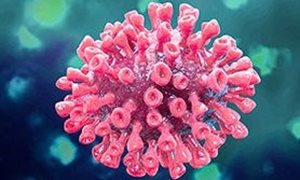12 February 2018
Malaria is a disease that spreads incredibly efficiently. The antimalarial medicines that are currently used cannot do much to stop this, because the parasites remain in the patient’s blood for a long time after treatment. This means that other mosquitos can be infected with the parasite if they bite the patient. The male and female parasites are fertilized in the mosquito’s stomach, the offspring are transferred back to humans when they are bitten by a mosquito, and the cycle starts again. In this way, just one malaria patient can cause more than 100 new malaria infections. In the fight against malaria, it is therefore very important to make sure that people are not able to infect other mosquitos.
Altruistic immunity
People who have been infected with malaria produce antibodies. These antibodies can provide protection from further infection, but they can also prevent the spread of malaria as the antibodies destroy the parasites in the mosquito’s stomach, or prevent fertilization. In that case, it is not the patient who benefits from the antibodies that he or she produces, but other people who are bitten by the mosquito. This is therefore an interesting form of altruistic immunity.
Malaria researcher Teun Bousema at Radboud university medical center and his colleagues at London School of Hygiene & Tropical Medicine (LSHTM), have discovered that 1 in 25 malaria patients are able to stop malaria spreading in this way. Amongst missionaries who had been infected with malaria dozens of times during their missionary work, immunity was even more common. Bousema: “This is the first time that we have been able to produce direct evidence that human antibodies against malaria parasite proteins are able to prevent the spread of malaria.”
Vaccine to halt spread
Research into whether people can stop the spread of malaria is incredibly labor-intensive. For each patient, dozens of mosquitos need to be investigated to see whether they have been infected after sucking up the blood of the malaria patient. Until recently, all these mosquitos needed to be dissected. Luckily, however, this problem has now been solved. Bousema: “We have developed a malaria parasite that expresses a firefly gene, allowing us to see just by looking at the mosquito whether or not it has been infected.” This has sped up the research considerably.
PhD student Will Stone studied people’s immune response to over 300 malaria proteins. Stone: “We saw that our test subjects produced antibodies that are able to slow the spread of malaria in response to 45 of these proteins. People with these antibodies were ten times less likely to infect mosquitos.” Stone will defend his thesis about this research on February 22nd at Radboudumc and will continue his research at LSHTM. Bousema: “This research enables us to better understand which patients prevent the spread of malaria. We are now looking at whether it is possible to develop a malaria vaccine using some of these proteins. A vaccine that prevents the spread of malaria would help reduce the disease burden of malaria worldwide.”
Publication:
Unravelling the immune signature of Plasmodium falciparum transmission-reducing immunity
Stone WJR, Campo JJ, Ouédraogo AL, Meerstein-Kessel L, Morlais I, Da D, Cohuet A, Nsango S, Sutherland CJ, van de Vegte-Bolmer M, Siebelink-Stoter R, van Gemert GJ, Graumans W, Lanke K, Shandling AD, Pablo JV, Teng AA, Jones S, de Jong RM, Fabra-García A, Bradley J, Roeffen W, Lasonder E, Gremo G, Schwarzer E, Janse CJ, Singh SK, Theisen M, Felgner P, Marti M, Drakeley C, Sauerwein R, Bousema T, Jore MM.
Nat Commun. 2018 Feb 8;9(1):558.

Teun Bousema
 Some people develop an immune response following a malaria infection that stops them from infecting other mosquitos. The antibodies that these people produce are sucked up by the mosquito and destroy the malaria parasite in the mosquito’s stomach.
Some people develop an immune response following a malaria infection that stops them from infecting other mosquitos. The antibodies that these people produce are sucked up by the mosquito and destroy the malaria parasite in the mosquito’s stomach.
Malaria is a disease that spreads incredibly efficiently. The antimalarial medicines that are currently used cannot do much to stop this, because the parasites remain in the patient’s blood for a long time after treatment. This means that other mosquitos can be infected with the parasite if they bite the patient. The male and female parasites are fertilized in the mosquito’s stomach, the offspring are transferred back to humans when they are bitten by a mosquito, and the cycle starts again. In this way, just one malaria patient can cause more than 100 new malaria infections. In the fight against malaria, it is therefore very important to make sure that people are not able to infect other mosquitos.
Altruistic immunity
People who have been infected with malaria produce antibodies. These antibodies can provide protection from further infection, but they can also prevent the spread of malaria as the antibodies destroy the parasites in the mosquito’s stomach, or prevent fertilization. In that case, it is not the patient who benefits from the antibodies that he or she produces, but other people who are bitten by the mosquito. This is therefore an interesting form of altruistic immunity.
Malaria researcher Teun Bousema at Radboud university medical center and his colleagues at London School of Hygiene & Tropical Medicine (LSHTM), have discovered that 1 in 25 malaria patients are able to stop malaria spreading in this way. Amongst missionaries who had been infected with malaria dozens of times during their missionary work, immunity was even more common. Bousema: “This is the first time that we have been able to produce direct evidence that human antibodies against malaria parasite proteins are able to prevent the spread of malaria.”
Vaccine to halt spread
Research into whether people can stop the spread of malaria is incredibly labor-intensive. For each patient, dozens of mosquitos need to be investigated to see whether they have been infected after sucking up the blood of the malaria patient. Until recently, all these mosquitos needed to be dissected. Luckily, however, this problem has now been solved. Bousema: “We have developed a malaria parasite that expresses a firefly gene, allowing us to see just by looking at the mosquito whether or not it has been infected.” This has sped up the research considerably.
PhD student Will Stone studied people’s immune response to over 300 malaria proteins. Stone: “We saw that our test subjects produced antibodies that are able to slow the spread of malaria in response to 45 of these proteins. People with these antibodies were ten times less likely to infect mosquitos.” Stone will defend his thesis about this research on February 22nd at Radboudumc and will continue his research at LSHTM. Bousema: “This research enables us to better understand which patients prevent the spread of malaria. We are now looking at whether it is possible to develop a malaria vaccine using some of these proteins. A vaccine that prevents the spread of malaria would help reduce the disease burden of malaria worldwide.”
Publication:
Unravelling the immune signature of Plasmodium falciparum transmission-reducing immunity
Stone WJR, Campo JJ, Ouédraogo AL, Meerstein-Kessel L, Morlais I, Da D, Cohuet A, Nsango S, Sutherland CJ, van de Vegte-Bolmer M, Siebelink-Stoter R, van Gemert GJ, Graumans W, Lanke K, Shandling AD, Pablo JV, Teng AA, Jones S, de Jong RM, Fabra-García A, Bradley J, Roeffen W, Lasonder E, Gremo G, Schwarzer E, Janse CJ, Singh SK, Theisen M, Felgner P, Marti M, Drakeley C, Sauerwein R, Bousema T, Jore MM.
Nat Commun. 2018 Feb 8;9(1):558.
Teun Bousema
Related news items

Chronic malaria infections produce more and more infectious gametocytes
28 April 2021 In a recent article in Nature Communications, researchers from the department of Medical Microbiology uncovered intriguing dynamics in the production of the transmission stages of malaria parasites, gametocytes. go to page
Invasive fungal infections in influenza and COVID-19
8 July 2020 The Aspergillus fungus is found in the lungs of many COVID patients. A parallel occurs with influenza patients, who often develop a serious fungal infection. Although such a serious fungal infection seems to occur less frequently in COVID-patients, alertness remains necessary, go to page
Early symptoms in Radboudumc healthcare workers who were tested for SARS-CoV-2
12 May 2020 In Eurosurveillance RIHS researcher Alma Tostmann and colleagues from the Radboudumc COVID-19 Team describe that general symptoms like fever, headache, general malaise and muscle ache were associated with a positive SARS-CoV-2 test. Respiratory symptoms however, were not predictive for SARS-CoV-2. go to page
Dealing with COVID-19 in low- and middle-income countries
26 March 2020 RIHS researcher Joost Hopman believes that low-and middle-income countries should intensify their preparedness for a possible COVID-19 outbreak. This was the core message of an opinion article that he wrote at the request of the medical journal JAMA. go to page
ERC Consolidator Grant for Bousema and Sechopoulos
12 December 2019 Teun Bousema and Ioannis Sechopoulos each receive an ERC Consolidator Grant of around two million euros. This European research subsidy will enable them to carry out research for the next five years. go to page
